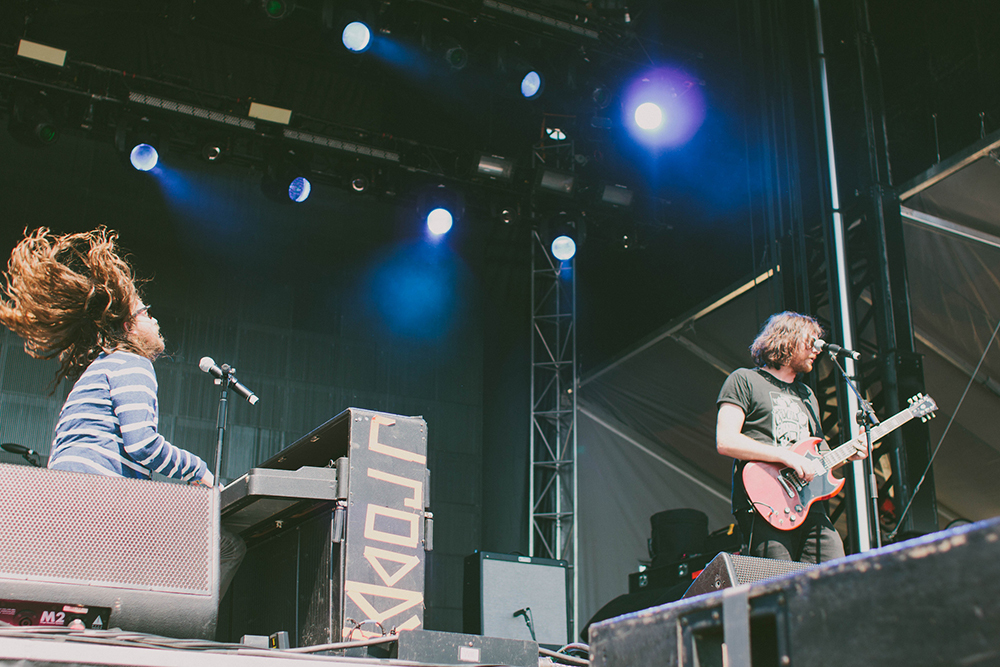
In the October issue of Baltimore, I wrote a brief profile on local rock band J. Roddy Walston and The Business. Though they’ve been selling out local clubs for years, the band released its first national album this summer and is currently gaining ground on a nationwide tour. I got a chance to talk to lead singer and piano player J. Roddy Walston and drummer Steve Colmus about their recent success.
Why did you make the transition from Tennessee to Baltimore back in 2004. What were some of the biggest culture shocks?
J. Roddy: The band had started to travel around some and we knew we wanted to get out of the small town we were living in. We played some in Baltimore, played the Talking Head, and always had a good time. Also, my wife sings opera and, when she was looking at conservatories, Peabody was on her list.
The whole thing was pretty shocking at first. We were living in Mt. Vernon, right downtown. I’d grown up in a town that wasn’t at all dangerous and none of my friends ever had anything stolen. But, not all the shocks were bad. There is a lot more diversity and different kinds of restaurants here. Baltimore is very, very cool. It’s got an artistic vibe, but it’s not too heavy, so I connected with that. It’s both a blue collar and an artistic city.
And Baltimore seemed to embrace you back.
J. Roddy: There were some people who immediately liked our band. But, I feel like we gained every fan by hard work. There wasn’t, like, a big breaking point where we opened for a bigger band and suddenly the city knew about us. We got out there and hustled a lot, handed out flyers. Before the last record came out, we burned a lot of CDs and gave out free stuff. It was maybe about two years ago, in the middle of us starting to tour a ton, when people in other cities started to take notice.
I would say the first moment was when we played the G-Spot about two years ago and the show before that wasn’t as attended as I would have hoped, so I thought Baltimore was going to stop caring about us. But then that show doubled in attendance. You get a little bit of press, some people see you, and you get messages from people. All the sudden, one night, everything kind of converges.
Steve: We were stuck there for a while because rock wasn’t happening in Baltimore and the crowd built slowly for a while. Something changed a couple years ago and the crowd started getting bigger and better. Pretty much every show we’ve had at The Ottobar has been sold out for the past couple years. I think Wham City kind of indirectly benefited us because it got people excited about local music. People got more fired up about going to shows. Rolling Stone giving Baltimore “Best Scene” gave us tailwind.
Most bands coming out of Baltimore these days do seem to be experimental, electronic, dance, etc. It’s refreshing to have a rock band put us on the map.
J. Roddy: We’re aware that we’re different than a lot of the bands doing well in Baltimore now. We were doing our thing before they all got famous. Dan Deacon was playing The Talking Head the same week as us. It wasn’t like we were fed up with artsy stuff and had to do something different. I’m surprised that [experimental music] is what took off in Baltimore. That was always kind of something that was happening on the side.
But there are still so many good rock bands here. I didn’t realize that Baltimore was suddenly tacked as an artsy music city until we were touring. It became easier for us to book because we were from Baltimore. What I thought was more of a hard working, blue collar place turned out to have a completely opposite ethos. All the sudden we’re finding out in other cities, Baltimore is becoming the Mecca of these other things. But, we’re just kind of doing our thing.
Steve: I’m from Pasadena, so I grew up going to the old Ottobar on Davis Street, and I knew Baltimore for some of the D.C. hardcore bands like Fugazi. I think part of it is that a lot of the experimental bands are transplants, so maybe it’s not a direct lineage. Since Liars Academy went away, there hasn’t been much of a rock presence in Baltimore. In terms of new bands playing rock, when we try to find a local rock band to open for us, it can be tough. It would be good to get people thinking about rock again.
What has it been like to release your first national album?
J. Roddy: Before, the only way somebody bought our CD would be at our show. It’s kind of cool rolling into cities where people have already bought the record. People have been singing the words to every song at shows, which brings it up to a whole new level. Even doing this interview is a little bit different. We’ve always been really good about touring and being a band, but all the media stuff is one of the biggest differences. We did produce a record that we’re proud of. It’s been cool to sort of see this thing that we’ve been working on so hard for many years take a life of its own.
Steve: I think we kind of feel like anything is possible. There are bands all the time that put out really great records that don’t go anywhere. But I think with Vagrant and the team that we have, we have a nice sort of apparatus behind it. We’ll know more in six months if we’ll get any traction. I’ve been playing in bands since I was 15 and this is the first time I think it’s conceivable we’ll be in a different place a year from now. You need to take a step back and see how much has changed. I think we’ve learned to keep kind of a level head.
You’re known for your energetic stage shows. How did you translate that to your album?
J Roddy: We went out and recorded in a really nice studio in L.A. We sort of hit this wall, like, the record’s great, but the live show is completely different. The tendency would be to overproduce, try to make this big record. But really we just tried to play these songs well and record them that way. We tried to make the songs strong enough to stand on their own without a bunch of fancy tricks. We recorded in a simple way in a really live, organic room so there’s less chance for things to be wild and crazy. It sounds like you’re in a room with us playing.
Steve: That was actually really difficult. We tried a bunch of different approaches: playing in different studios, playing live in studio, playing together, and playing separate. We didn’t obsess over takes as much. It was like pretty much every take that’s on the album was from the first three takes. All of us were kind of feeling the pressure of the first record. There were moments where it’s not really comfortable, which almost kind of translates the nerves of being on stage. You can tell it’s not, “Let’s do 100 takes and pick the very best one.” We kind of went for a rough-and-tumble approach.
Most rock bands these days overlook the piano—it almost seems old school to use one. What is it that’s drawn you to the instrument?
J Roddy: I grew up around the piano. My grandmother was always playing it. All the houses I spent time in had pianos. I think there was a point when I was younger when I was listening to new and old bands and I stopped listening to bands that only had guitar, bass, and drums. I wanted something other than that. For a while, I got more into keyboards, but as I started writing faster-paced and pound-it-out kind of songs, I realized there’s no keyboard that sounds good doing that. So, piano was it.
I do write on and play guitar, but I kind of felt like there was more room to do whatever I wanted on piano because there weren’t that many people doing that in rock bands. Not a lot of the rules have been written. I just kind of beat the crap out of the thing and after the show people are like, “You’re such a great piano player.”
